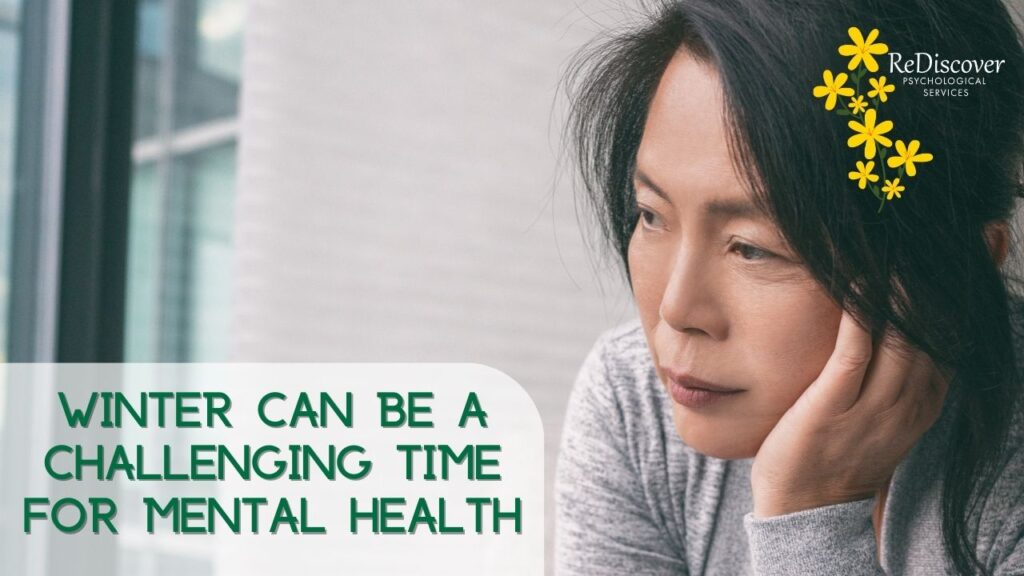
Edmonton Psychologist | Winter Can Be A Challenging Time For Mental Health
Ever feel that as soon as winter is on it’s way, that things tend to get a little bit harder? You’re not alone says Edmonton psychologist Wanda Chevrette. Wanda, a registered psychologist says that there are many reasons why people often are down at this time of year. In part one of our two part series, we look at why winter can be so hard for so many, especially how far north Edmonton is. The good news though, is that there are many ways to combat the winter blues, and help you cope until your days are brighter (both figuratively and literally!)
Seasonal Affective Disorder Is Real
Many people experience the blues during the winter, and while this is normal. Wanda Chevrette, the Edmonton psychologist owner of ReDiscover Psychology says that there is a difference between winter blues and Seasonal Affective Disorder (SAD). SAD is a type of depressive order related to seasonal changes. From fall to winter, and then from spring to summer. Unlike the winter blues, Seasonal Affective disorder affects brain chemistry, and can be diagnosed if you’ve had several days of down mood in a row, or you can’t remember the last time you felt like yourself.
Some symptoms to be aware of for winter Seasonal Affective Disorder includes:
- No interest in your favorite activities
- Low energy and listless on a daily basis
- Sleeping too much
- Inability to concentrate
- Craving carbohydrates and overeating
- Feeling worthless, hopeless or thoughts of not wanting to be alive
If you have any of these thoughts, it’s a good idea to see your doctor. A diagnosis of SAD can help you start finding treatments such as light therapy with an OTT lamp, psychotherapy and medications if you require. Remember not to feel ashamed if you have any of these feelings, depression is not your fault, and is treatable. It’s best to seek out diagnosis and treatment as soon as you recognize the symptoms.
Edmonton Psychologist | We See Less Sun
In Edmonton, this far north of the equator, we see far less sun in the winter than we’d like. While we are constantly in a state of days getting longer, or days getting shorter, fewer people complain about the long days, where we get to see the sun for extended periods. Not only is not seeing the sun a disappointment, admits Edmonton psychologist Chevrette.
But it actually affects us physically and mentally as well. The less sunlight we see, means the less vitamin D we have in our body, because our bodies actually manufacture vitamin D whenever our skin is exposed to the sun. Vitamin D helps our bones and muscles stay strong, and strengthens our immune system. If people are wondering why they get sicker in the winter, may have unlocked the key.
Researchers also believe that a vitamin D deficiency contributes to the risk of developing multiple sclerosis (MS), which is why so many people in this latitude have MS. In fact, Canada is ranked number one in the world for multiple sclerosis cases. It stands to reason that lack of sunlight affects so many things in our body and mind. But also, there’s the psychological affect of having so much darkness.
Baby It’s Dark Outside
During winter solstice, the shortest and darkest day of the year, we see only seven and a half hours of sunlight. Luckily, the days will immediately start getting longer from here. It’s also important to note that the significantly darker days of our winter can also disrupt the circadian rhythm of our body. The circadian rhythm is our body’s natural, internal clock. It dictates our normal wake up and fall asleep times. However, with so much dark in Edmonton’s winter, says Edmonton psychologist. That natural rhythm is impacted, altering that natural pattern.
In addition to vitamin D, sunlight boosts serotonin, an important mood stabilizing hormone. More serotonin lifts our mood, helps improve our concentration, minimizes anxiety. As well, the less sunlight we see, the more our bodies boost melatonin production – the hormone that helps us sleep. So if you find yourself feel energized in the summer and sluggish in the winter, it’s likely your hormone levels impacted by the sun, or lack thereof.
However, you don’t need to sunbathe to get the benefits of the sun. 5 to 15 minutes two to three times a week of sunlight exposure is enough. When those grey winter sky clouds clear, set your timer for five minutes and get a brain boost by the sun advises Edmonton psychologist Chevrette!
Get support before you need it! Edmonton psychologist ReDiscover Psychology have numerous therapists with several specialties and many locations to help as many people as possible. Call today to set up an appointment to talk to someone who can help you gain perspective. Someone is waiting to hear from you. Part two of our series continues to explore why winter can be challenging mentally and emotionally, and what you can do about it!
